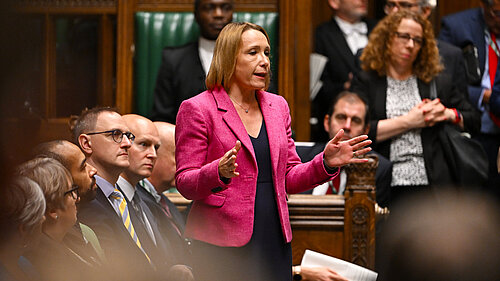Helen highlights terminally-ill constituent’s case in Commons

Helen Morgan MP highlighted the case of a terminally ill constituent who struggled to find hospice care as she called for the Government to urgently work cross-party to solve the social care crisis.
Speaking in Parliament, the MP and Liberal Democrat Spokesperson for Health and Care emphasised the huge impact the care crisis is having on bed blocking, ambulance waiting times and community care.
Helen told Health Secretary Wes Streeting of a case in Wem where the family of a terminally-ill constituent sought Helen’s support to access hospice care at home after initially being told there was no capacity.
She called on the Government to speed up the social care review being led by Baroness Casey and work with all political parties to find a solution as fast as possible.
It comes as social care continues to account for more than 80% of Shropshire Council’s budget, forcing councillors to restrict other services so they can fulfil their statutory responsibilities.
Speaking in the House of Commons, Helen Morgan said, “It is widely acknowledged that the crisis in social care is a cause of dangerously high occupancy rates in hospitals that lead to the horrors of corridor care, the dreadful ambulance waiting times that we have seen and a knock-on effect on the community.
“When I was contacted by the family of a terminally ill man in Wem in my constituency last month, I was reminded that not only is care often provided in the wrong place, but it is often not available at all.
“Will the Government bring forward the timeline for the horribly delayed Casey review to report back, get it done this year and heed Liberal Democrat calls for cross-party talks so that we can agree on a long-term solution for the crisis?”
Helen also challenged the Government over trade negotiations with Donald Trump which could add costs to community pharmacies that are already struggling due to dispensing many critical medicines to patients at a loss.
The next phase of trade talks is set to include higher prices for pharmaceuticals made in the United States which could in turn be passed onto pharmacies and patients.
Speaking in the House of Commons, Helen Morgan added, “Across the country, community pharmacies struggle not only with supply chain problems but with dispensing some of the critical medicines for our constituents at a loss. I was concerned to read that higher prices for United States pharmaceuticals are on the table for the next stage of trade negotiations with Donald Trump, because an additional £1.5 billion would cost both the NHS and our community pharmacies dear.
“What steps is the Department taking to ensure that the NHS, and the vital medicine supply on which we rely, will not be used as a bargaining chip in a trade deal with a highly unreliable US President?”
Responding, Karin Smyth, Minister for Secondary Care, said, “The hon. Lady has asked an important question about the pharmaceutical industry, which is key to the country’s growth mission and to supporting all our constituents and the entire country.
“As we know, my right hon. Friend the Prime Minister is currently attending the G7 summit. We have good relationships with America, and the Department is working closely across Government to ensure that the same stability of supply remains for our constituents.”
